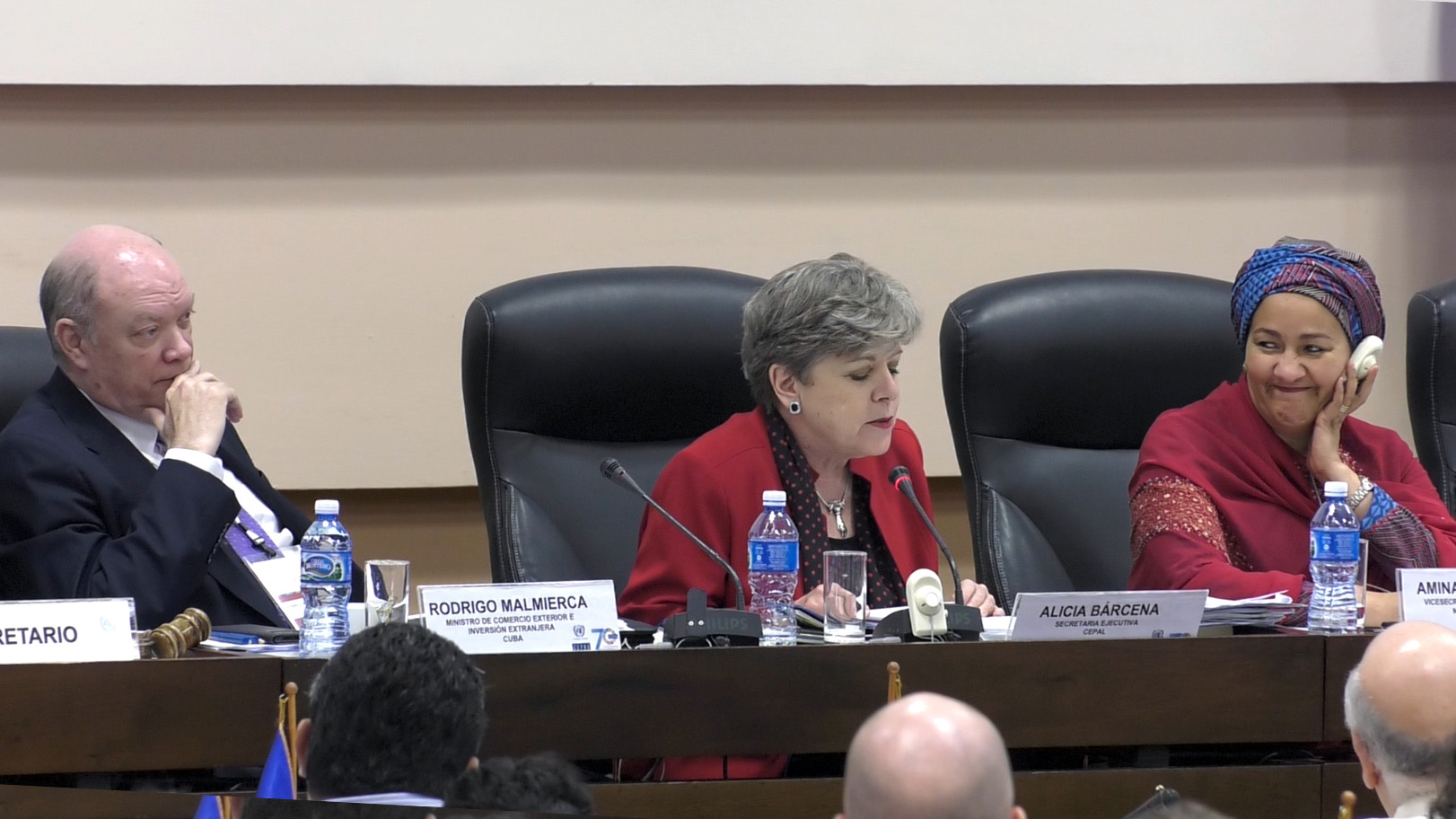ECLAC Renews its Calling to Serve as a Pertinent and Effective Instrument for Regional Development
Work area(s)
Amina Mohammed, United Nations Deputy Secretary-General, Alicia Bárcena, Executive Secretary of the regional commission, and Rodrigo Malmierca, Cuban Minister of Foreign Trade and Investment, closed the thirty-seventh session of ECLAC held in Havana, Cuba.

The Economic Commission for Latin America and the Caribbean (ECLAC) renewed its commitment to serve as a pertinent and effective instrument for the region’s development during the closing of the UN regional organization’s thirty-seventh session, which concluded on Friday in Havana, Cuba.
The closing ceremony was led by Amina Mohammed, United Nations Deputy Secretary-General, Alicia Bárcena, ECLAC’s Executive Secretary and Rodrigo Malmierca, Cuban Minister of Foreign Trade and Investment.
“This session has reinforced ECLAC’s long tradition of sustainable dialogue with its members, maintaining an exceptional base for honest debate on the collective challenges, responsibilities and, most importantly, your aspirations,” asserted Amina Mohammed.
She likewise praised the regional commission’s work and asserted that the agreements reached by the countries in the framework of the thirty-seventh session “demonstrate that we have a robust and inclusive ECLAC.”
She added that the document The Inefficiency of Inequality identifies the challenges facing Latin America and the Caribbean, and thanked the countries of the region “for their firm commitment to the 2030 Agenda for sustainable development.”
“I echo what the Secretary-General said in reference to ECLAC as an important part of the United Nations that has always been on the front lines for the inclusion of sustainable development,” added Amina Mohammed.
“Seventy years have shown us that ECLAC has established itself as a center of regional thinking for equality that is at the core of efforts in pursuit of development and is one of the pillars of sustainable development,” she affirmed.
“I congratulate Alicia (Bárcena) for her passion, her integrity, her knowledge and her commitment,” she added.
Alicia Bárcena renewed ECLAC’s commitment to serve as a pertinent and effective instrument for the region’s development and reiterated her promise to “serve, with the tradition of the Commission’s capacities, all our member countries, their particular demands, in unrestricted respect for their sovereignty.”
The Executive Secretary stated to the ministers and high authorities of ECLAC’s member countries that “in times of complex challenges to the value of multilateralism, the people of Latin America and Caribbean, aware of our rich diversity, confirm the virtues of preserving this space of precious fraternal and respectful dialogue.”
“ECLAC is a tool for this region, its space for constructive meetings under the premise of jointly exploring paths to the dignified, fair and sustainable development of our peoples, where we can come together, share, exchange experiences and forge convergent outlooks,” Bárcena said.
She added that, in light of the challenges posed by the 2030 Agenda in its economic, social and environmental dimensions, old paradigms must be broken. To do this, policies to stimulate economic development and the reduction of inequality cannot be deployed in the usual way.
“This is about a new style of development, about equalizing to grow and growing to equalize. It is about finding a foothold in the roots of our shared identity to push us toward a better tomorrow. It is about mapping out a promising route – Latin American and Caribbean – to obtaining the goals of the civilizing agenda that the world has proposed leading up to 2030,” she affirmed.
During her speech, ECLAC’s Executive Secretary expressed her appreciation for the 70th anniversary congratulations extended to the organization created by the initiative of the Chilean diplomat, Hernán Santa Cruz, in 1948.
“We are extremely grateful to Chile for the support it has always given ECLAC, not only for being our home country but also for all the staff there who work at our headquarters,” she affirmed.
Minister Rodrigo Malmierca expressed his honor, on behalf of Cuba, in assuming the presidency pro tempore of ECLAC and pledged that Cuba will work “with commitment and responsibility” over the next two years.
He also specified that Cuba will prioritize the Caribbean region in its work, which requires special support due to its vulnerabilities.
The Minister affirmed that ECLAC “grows stronger every day in attending to the problems our region is facing.”
During the session, the ECLAC member countries approved the Havana Resolution, which salutes the integrated approach to development that has characterized the organization’s thinking.
Related event
Thirty-seventh session of ECLAC
El período de sesiones es la reunión bienal más importante de la Comisión Económica para América Latina y el Caribe (CEPAL). Ofrece un foro que permite analizar temas relevantes para el desarrollo de…
Related content
Thirty-seventh session of ECLAC
El período de sesiones es la reunión bienal más importante de la Comisión Económica para América Latina y el Caribe (CEPAL). Ofrece un foro que permite analizar temas relevantes para el desarrollo de…
Country(ies)
- Latin America and the Caribbean
Contact
Public Information Unit
- prensa@cepal.org
- (56 2) 2210 2040